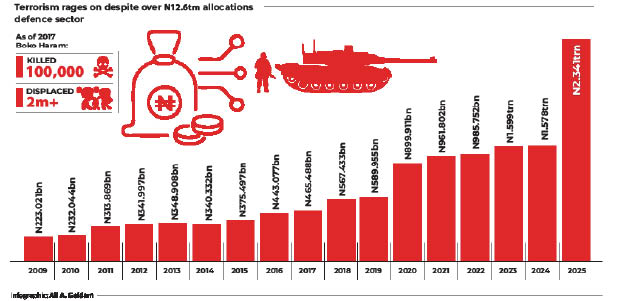The killing of the 39-year-old founding leader of Boko Haram, Mohammed Yusuf, in Maiduguri, Borno State, was supposed to put paid to the 2009 insurgency uprising in the North-East; instead, the group has since morphed into one of the world’s deadliest terrorist groups, defying various counterterrorism measures.
Starting from the late President Umar Musa Yar’adua-led government, Weekend Trust reports that successive administrations have deployed strategic plans and allocated substantial amounts every fiscal year to stamp out terrorism, to no avail.
As at 2017, former Governor Kashim Shettima of Borno State disclosed that Boko Haram had killed 100,000 people and displaced over two million locals. The killings have surged since then as insurgents continue to unleash terror on residents.
During the Yar’adua administration, the police led the crackdown on what was then an emerging terror group, killing Yusuf in the process. Boko Haram became increasingly deadly under President Goodluck Jonathan, forcing the federal government to deploy full military force in the North-East.
- Food security: Farmers battle high cost of inputs, interest rates, grains importation
- Democracy in Nigeria: 3rd Republic governors: Where are they?
Operation Restore Order, a Joint Task Force (JTF) comprising the military, police, State Security Service and other security agencies, was established in June 2011 to repel insurgents and restore law and order to Borno and other affected areas.
However, the measure was not enough to stop Boko Haram fighters from raiding Bama on May 8, 2013, killing more than 50 persons and freeing over 100 prison inmates. About 200 terrorists in buses and pickup trucks had carried out coordinated strikes on army barracks and a police station before breaking into the town’s prison.
In what he described as “extraordinary measures” to curb the growing violent onslaught, Jonathan declared a state of emergency in Borno, Yobe and Adamawa states one week after the Bama attack.
Earlier, on December 31, 2011, Jonathan had made a similar declaration in some local government areas in Niger, Plateau, Yobe and Borno states following a series of bombings by Boko Haram on Christmas Day that killed at least 37 people in a church. He also ordered the shutdown of Nigeria’s borders with Cameroon, Niger and Chad in the North-East.
In August 2013, the military changed Operation Restore Order to Operation Boyona, a blending derived from the top three insurgency-ravaged states. It was later renamed Operation Zaman Lafiya (peaceful living). The Jonathan administration also sought international support, including intelligence-sharing and equipment from the United States and Germany.

